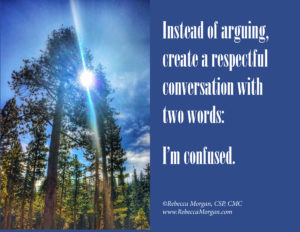
Many disagreements are caused by misunderstandings. These can be as simple as someone not accurately hearing what the other said. Or they can be misinterpreting the other’s actions in the worst possible way.
Two words can head off escalating the misunderstanding into a full-fledged argument, with loud voices, emphatic inflection, and accusatory words.
Instead of declaring inaccurate conclusions, condemning perceived motives, and mischaracterizing behaviors, try these two words instead.
“I’m confused.”
Then calmly state what you thought you heard, saw or understood, owning that these are your experience, not declaring absolutely that this is what the other person did or said. Follow that with the possibility you could be in the wrong.
“I’m confused. I thought you said you’d deliver the report by this morning. Did I misunderstand?”
“I’m confused. My understanding was that you’d pay the bill no later than yesterday. Did you say something different?”
“I’m confused. My memory is that you said you’d have the sample by noon. Did I misremember or did something come up?”
“I’m confused. I thought we were jointly going to create the report. Did I miss your telling me you were going to do it on your own?”
Do you see how these comments state your understanding in a non-accusatory manner. You are not saying, “You said you’d deliver the report by this morning!” You are not adding, “Where is it?” or “You missed the deadline.” or “You do this all the time.” You’re simply stating your understanding.
Then you follow up with a way for the other person to save face. Perhaps you did misunderstand. You are not saying that you are right. You’re acknowledging there was a breakdown either in one or both of your understanding, or in follow through.
By saying, “”I’m confused,” you’re saying you want to discuss how your understanding is different than what you thought was going to happen. You’re respectfully allowing the other person to explain his/her understanding and thinking.
These two words will create a respectful conversation and connection. Much more so than accusing and arguing.
_____________
This is an excerpt from Rebecca’s book, Life Is a Self-Designed, Personal Growth Seminar..